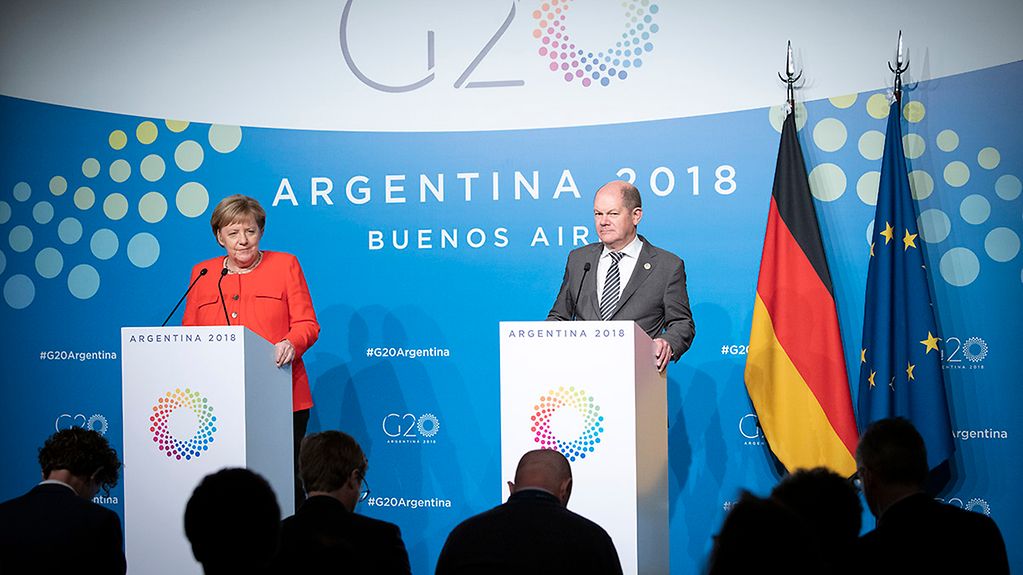G20 summit in Buenos Aires
The 13th G20 summit was held in Buenos Aires from 30 November to 1 December 2018. The motto of Argentina’s G20 Presidency is "Building Consensus for Fair and Sustainable Development". Here is an overview of the key results.
2 min reading time

Chancellor Angela Merkel and Federal Finance Minister Olaf Scholz present the results of the G20 summit
Photo: Bundesregierung/Bergmann
The G20 achieved a consensus on key global challenges at a difficult time for multilateral cooperation. Ten years after they first met at the level of heads of state and government, the G20 reaffirmed their will to work together for an rules-based international order and to further enhance this. Many of the outcomes build on resolutions adopted at the 2017 G20 summit in Hamburg, or make reference to these resolutions.
- For the first time, the G20 affirmed its support for reforming the World Trade Organization – an important signal of its support for the multilateral trade system that stands against protectionism and in favour of open markets.
- The G20 sent a strong message to the UN Climate Change Conference (COP24):
- All G20 states with the exception of the USA again affirmed the irreversible nature of the Paris Agreement, and committed to its full implementation;
- For the first time, the G20 noted the goal of keeping global warming down to 1.5° Celsius;
- The G20 looked forward to the successful outcomes of the UN Climate Change Conference (UNFCCC COP 24);
- Germany announced that it would be doubling its contribution to climate finance through the Green Climate Fund to up to 1.5 billion euros.
- The G20 supports the continuation of the Compact with Africa Initiative launched under Germany’s G20 Presidency. The Initiative fosters investment, employment and sustainable development in Africa.
- Health, which was a priority of Germany’s G20 Presidency, is to be finally mainstreamed in the G20 agenda. The G20 are to continue to fight anti-microbial resistance, as well as strengthening health systems and supporting the central role of the World Health Organization (WHO). The G20 is to support the WHO on the development of an action plan to realise the health-related aspects of the Sustainable Development Goals (SDGs) by 2030.
- The G20 stressed the important of joint measures to address the root causes of displacement and meet the challenges posed by global refugee movements. The G20 will continue to address the issues of displacement and migration in future.
- The G20 will continue to work together to empower women; they reaffirmed the goal of reducing the gender gap in labour force participation rates by 25% by 2025 and aim to reduce the gender pay gap.
- The G20 agreed to continue to work together to fight international terrorism.
- The G20 will continue to fight unfair tax competition and aggressive tax practices on the part of companies with international operations – the G20 urges that a consensus-based solution to taxing the digital sector be developed by 2020.